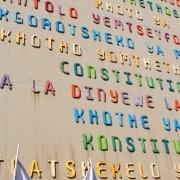|
Getting your Trinity Audio player ready...
|
Corruption Watch takes Gauteng Department of Education to court over battle for access to information
In Corruption Watch’s annual report, it was revealed that most corruption complaints originate from Gauteng, followed by Free State and KwaZulu-Natal. The organisation received 2 714 reports of corruption in 2014 – an average of seven a day – and of these, 56% were confirmed as corruption in terms of Corruption Watch’s official definition.
Corruption in provincial government was the most reported, with the schools sector the top corruption hotspot for the year. Reports of schools corruption came from all provinces, but mainly from Gauteng, Free State, the Eastern Cape and KwaZulu-Natal. Financial mismanagement, theft of funds and tender corruption topped the list of complaints, and principals, school officials and members of governing bodies were fingered as the main perpetrators.
As part of Corruption Watch’s (CW) approach to combating and preventing corruption, investigations are done on a small number of these reports. In most cases, whistle-blowers are unable to provide much information in their reports because of their inability to access such information.
Therefore as part of CW’s investigations, requests for information held by the Gauteng Department of Education (GDE) on behalf of schools are made in almost all matters.
When it comes to accessing information, CW relies on the Promotion of Access to Information Act and requests information from the GDE’s information officer, Mr Boy Ngobeni, (as the holder of information on behalf of most schools in Gauteng).
Most requests for information are ignored or rejected on unjustifiable grounds. Often the GDE only acknowledges a request for access to information when CW appeals their failure to respond to an initial request.
Having been frustrated over and over again with a process which should guarantee access to information in terms of section 32 of the Constitution, CW has decided to take the GDE to court over their failure to abide with constitutionally guaranteed processes. Court papers were issued in the North Gauteng High Court on 26 March 2015 and are being served on all parties. Copies of the papers may be accessed here.
Access to information is a key constitutional guarantee and an important part of democratic rule and citizen participation, as has been evidenced in the debates on the Secrecy Bill. We are deeply concerned about the GDE’s response to our requests and hope that this litigation results in better responses and ultimately more completed investigations on the part of CW.








